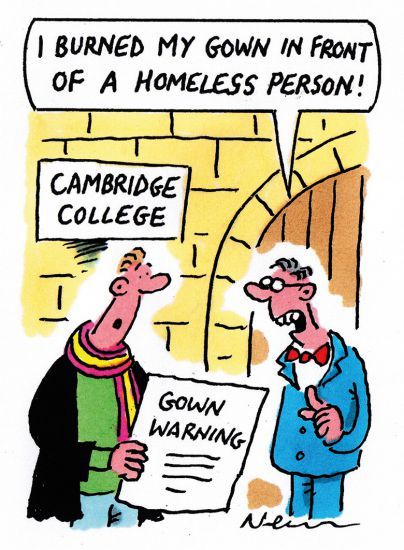
News last week that UK universities were being enticed to set up in France as part of the University of Paris Seine’s plans for an international campus in the capital sparked fevered speculation about who might be first to grab the opportunity. It didn’t take long for the University of Oxford’s name to be mentioned, courtesy of newspaper reports on 20 February. The Daily Telegraph exclaimed that the university might break with “700 years of tradition” and open a foreign campus, basing its story on the fact that “senior staff” had been in talks with those running the Paris Seine project. Times Higher Education understands that this might have been slightly over-egging the crème brûlée as the talks were not conducted at the top level, but surely it will not be long before a university in the UK does take the plunge and counter a possible hard Brexit with a foray on to the Continent.
Scholars have had their say on The Archers storyline that gripped the nation for months at an academic conference dedicated to the BBC Radio 4 drama. Much of the annual Archers symposium, held at the University of Lincoln on 18 February, was devoted to the various twists and turns of the Helen and Rob Titchener saga, which ended in September with Helen’s acquittal for attempted murder, the Lincolnshire Echo reported on 17 February. Papers due to be given by academics included one about the “soundtrack to a stabbing”, a forensic blood pattern analysis at Blossom Hill Cottage and another about coercive and controlling partners. Other discussions covered more conventional ground for Ambridge fans, such as class, flower shows and birdwatching – but they are less fertile ground for university criminologists and psychologists than knife-wielding Helen and her gaslighting, abusive husband.
A University of Cambridge college has advised its students not to wear their gowns out and about amid concerns that an anti-undergraduate backlash by townies has turned violent, the Evening Standard reported on 16 February. The warning by St Catharine’s College follows the assault of a cyclist wearing a gown just days after footage emerged of berobed law student Ronald Coyne attempting to burn a £20 note in front of a homeless man after a night out, the paper said. A rock wrapped in duct tape was also thrown through a lecture hall window, the newspaper added, while a petition to kick Mr Coyne, a student at Pembroke College, out of the university has gained more than 20,000 signatures, The Sun reported on 13 February. In an email reportedly received by students, St Catharine’s tutor Paul Hartle said that it “might be prudent for a while at least not to wear your gown about town”, citing the “recent unhelpful local publicity about the stupidly arrogant behaviour of a particular student (from another college)”.
A university has boldly gone where most universities have not gone before – by setting up its own science fiction research group, the Cambridge News reported on 16 February. Anglia Ruskin University’s new Centre for Science Fiction and Fantasy opens as sales of dystopian sci-fi have rocketed in the wake of Donald Trump’s election as US president, said the centre’s director, Helen Marshall. “The current interest in alternative facts and George Orwell’s 1984 shows just how relevant our extrapolations of past concerns into future imaginings can be,” said Dr Marshall, who is also a sci-fi novelist. “As Orwell himself says: ‘He who controls the past controls the future. He who controls the present controls the past,’” she added.
While some claims on Paul Nuttall’s (now-offline) CV might be questionable, Times Higher Education can state that he was indeed a university lecturer. Three months ago, Liverpool Hope University confirmed that the Ukip leader – whose claims about his links to victims of the Hillsborough tragedy have been blamed on a junior press officer – was a temporary hourly paid lecturer between 2004 and 2006, according to a Mail on Sunday story on 4 December. However, stories that resurfaced last week during the Stoke-on-Trent by-election campaign might suggest that Mr Nuttall – Ukip’s candidate for the seat – was honing his buck-passing tactics way back in his early academic career. According to a New Statesman article in December, one of Mr Nuttall’s teachers at Liverpool Hope once questioned why the then 23-year-old had included references to Holocaust denier David Irving in an essay on the causes of the Holocaust, despite the discredited historian not appearing on the reading list. When it was raised, Mr Nuttall apparently blamed the error on his girlfriend, who had taken the references from the internet, suggesting that his move to anti-European politics didn’t exactly deprive academia of its most diligent historian.